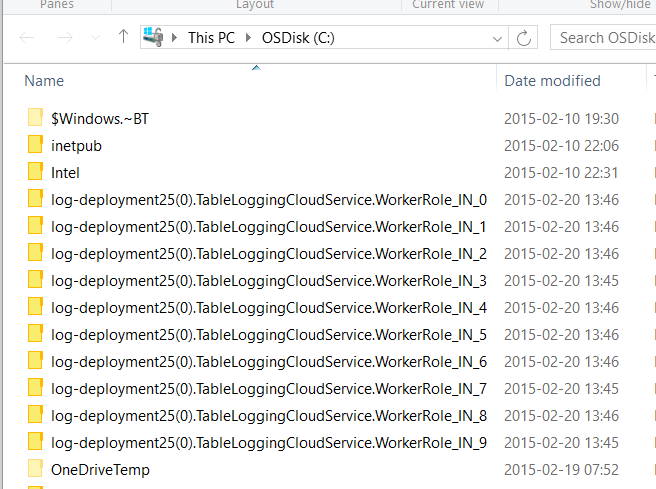Logging @Azure startup task output to disk: http://t.co/UU0dwz18bE #PaaS #CloudServices
— Chris Geuer-Pollmann (@chgeuer) 20. February 2015When I develop an Azure cloud service (PaaS), I often have setup scripts which need to run. Usually, these scripts generate some form of output on STDOUT and STDERR, which I’d like to capture somewhere. So the easiest way would be to write that output to some fixed location, such as C:\logs and grab it from there.
The problem with this approach is that it doesn’t work well in the development fabric, i.e. when I simulate multiple WebRoles or WorkerRoles on my development laptop, cause all scripts running in parallel, writing to the same folder, isn’t a great idea. I wanted a solution where the real setup script simply spits out log data to the console, and where that output is written to a unique directory.
In this sample, you can see that this unique directory is a folder like C:\log-deployment25(0).TableLoggingCloudService.WorkerRole_IN_3, where the folder name contains the deployment ID and instance ID, and a new log file for each execution of the setup script (for instance, after a machine reboot).
You can have a look at my github project for a sample implementation.
 </img>
</img>
Implementation
The solution uses a chain of 4 batch and PowerShell scripts to achieve this goal. Maybe it’s over-engineered, but I couldn’t come up with a simpler solution:
- First, the
csdeffile lists a startup task forcommandLine="SetupScripts\install.cmd" - The batch file
install.cmdlaunches the PowerShell scriptinstall.ps1 install.ps1- determines deployment ID, role instance ID,
- derives logfile names,
- sets local environment variables accordingly
- kicks off
install2.cmd
install2.cmdstartsinstall2.ps1(the actual workhorse), redirecting STDOUT and STDERR to the proper logfileinstall2.ps1does whatever it has to do, simply spitting out data to STDOUT
CloudService/ServiceDefinition.csdef
First, the csdef file lists a startup task for commandLine="SetupScripts\install.cmd".
<!-- CloudService/ServiceDefinition.csdef -->
<ServiceDefinition ... >
<WorkerRole name="..." vmsize="...">
<Startup>
<Task commandLine="SetupScripts\install.cmd" executionContext="elevated" taskType="simple" />
</Startup>
</WorkerRole>
</ServiceDefinition>
WorkerRole/SetupScripts/install.cmd
The batch file install.cmd launches the PowerShell script install.ps1
REM WorkerRole/SetupScripts/install.cmd
cd /d "%~dp0"
%SystemRoot%\System32\WindowsPowerShell\v1.0\powershell.exe -ExecutionPolicy Unrestricted -File "%~dp0install.ps1"
exit /b 0
WorkerRole/SetupScripts/install.ps1
- determines deployment ID, role instance ID,
- derives logfile names,
- sets local environment variables accordingly
- kicks off
install2.cmd
# WorkerRole/SetupScripts/install.ps1
[void] [Reflection.Assembly]::LoadWithPartialName("Microsoft.WindowsAzure.ServiceRuntime")
if (![Microsoft.WindowsAzure.ServiceRuntime.RoleEnvironment]::IsAvailable)
{
Write-Host "Not running in fabric, exiting"
return;
}
$drive = "C"
$prefix = "log-"
$logfolder = "$($drive):\$($prefix)$([Microsoft.WindowsAzure.ServiceRuntime.RoleEnvironment]::CurrentRoleInstance.Id)"
$logfilename = "$($logfolder)\$([System.DateTime]::UtcNow.ToString("yyyy-MM.dd--HH-mm-ss-fff")).txt"
if (-not (Test-Path -Path $logfolder))
{
[void] (New-Item -ItemType Directory -Path $logfolder )
}
[System.Environment]::SetEnvironmentVariable("$logfolder", $logfolder)
[System.Environment]::SetEnvironmentVariable("logfilename", $logfilename)
Start-Process -NoNewWindow -Wait -FilePath "$($Env:windir)\System32\cmd.exe" -ArgumentList "/C $(Get-Location)\install2.cmd"
WorkerRole/SetupScripts/install2.cmd
install2.cmd starts install2.ps1 (the actual workhorse), redirecting STDOUT and STDERR to the proper logfile (> %logfilename% 2>>&1)
REM WorkerRole/SetupScripts/install2.cmd
cd /d "%~dp0"
%SystemRoot%\System32\WindowsPowerShell\v1.0\powershell.exe -ExecutionPolicy Unrestricted -File "%~dp0install2.ps1" > %logfilename% 2>>&1
exit /b 0
WorkerRole/SetupScripts/install2.ps1
install2.ps1 does whatever it has to do, simply spitting out data to STDOUT (via Write-Host)
# WorkerRole/SetupScripts/install2.ps1
[void] [Reflection.Assembly]::LoadWithPartialName("Microsoft.WindowsAzure.ServiceRuntime")
if (![Microsoft.WindowsAzure.ServiceRuntime.RoleEnvironment]::IsAvailable)
{
Write-Host "Not running in fabric, exiting"
return
}
$logfolder = [System.Environment]::GetEnvironmentVariable("$logfolder")
Write-Host "All my STDOUT goes to $($logfolder)"
Write-Host "Doing some stuff"
[System.Threading.Thread]::Sleep(1000)
Write-Host "Doing other stuff"
Of course, don’t forget to mark all the setup files with “Copy Always” in Visual Studio’s file properties :-).
That’s it. Have fun, Christian